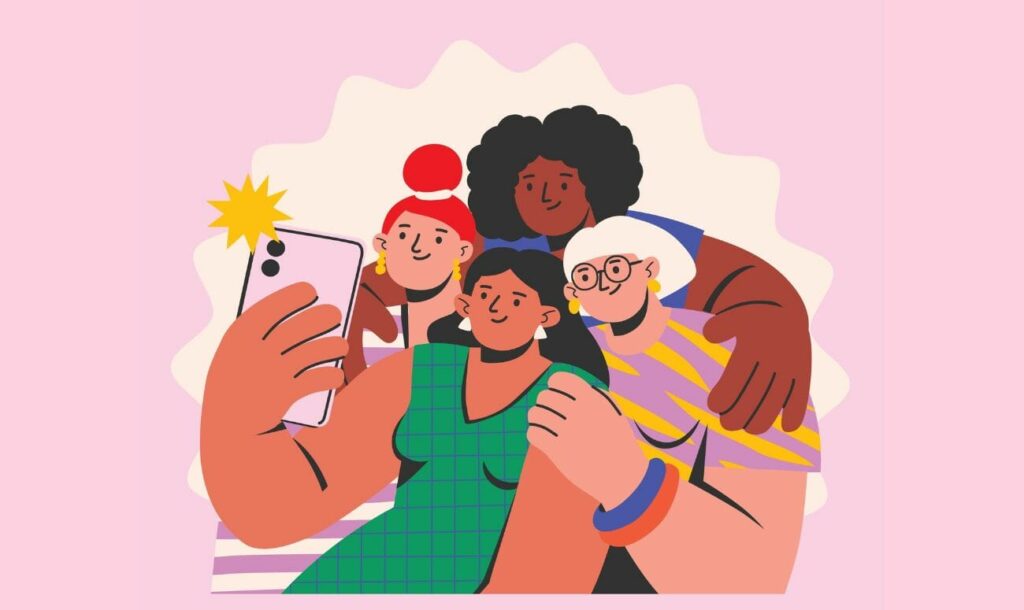
In a society obsessed with romantic love and fairy-tale endings, the concept of platonic love often takes a backseat. Platonic love emphasizes a deep emotional and intellectual connection between people without romantic involvement. It celebrates and encourages a sense of love, respect, and support. By reimagining relationships beyond romance, we open ourselves to myriad possibilities. Learn about the power of platonic love and how this often-overlooked form of connection can enrich your life in countless ways. (Estimated reading time: 11 minutes)
“True friendship withstands time, distance, and silence.”
– Isabel Allende
Relationships are the bedrock of life. Most of us rank healthy and meaningful relationships at the top of our list of essential things.
A hug from a family member, a fun night out with friends, holding hands with our beloved, or a brief but enjoyable exchange with our next-door neighbor — each connection plays a vital role in the tapestry of our experiences.
But in a society obsessed with romantic love and fairy-tale endings, we tend to fixate on romantic connections, and other connections rooted in platonic love take a backseat. Finding “the one” is a common theme in countless feel-good Hollywood movies, making us crave the passion and desire that comes with it. Yet, what if we could reimagine the idea of love and how it plays out in our lives?
That question isn’t meant to push romance aside or diminish its importance; instead, it encourages us to broaden our focus to include the equally powerful platonic relationships we have, whether they are uplifting or challenging. Finding “your people,” a tribe who stands by you through thick and thin, offers a unique sense of companionship, camaraderie, and stability we may not get in our romantic connections.
Who wouldn’t want to be part of a group with Chandler, Rachel, Phoebe, Ross, Joey, and Monica in Friends? Or Carrie, Samantha, Charlotte, and Miranda in Sex and the City? Or Harry, Ron, and Hermione in Harry Potter? Or Woody and Buzz Lightyear in Toy Story? We all look up to these idealized portrayals of enduring bonds that show us how much joy, sustenance, and learning we can gain from them.
Think back to your days at school or college and extracurricular groups where you bonded over common issues with friends or teachers. You may have been surrounded by your family and relatives with whom you could share a cup of tea or play sports.
Unfortunately, as we get older and move into the world, we’re less likely to be in spaces where we meet new people and regularly spend time with them. As a result, according to research, more than 35% of adults in the U.S. say they feel lonely.
We can avoid loneliness creeping into our lives by opening ourselves to platonic love, expanding our palette of relationships, and opening ourselves to myriad possibilities.
Platonic love allows us to form deep connections with friends, colleagues, mentors, and even ourselves. It challenges societal expectations and provides a safe space for emotional growth and authentic connection.
In his book Road to Character, journalist David Brooks writes, “The people who really have a character make deep, unshakable connections to something outside themselves.” The right types of platonic relationships ground and anchor us. You’ll enrich your life in countless ways by consciously seeking them out.
The history and philosophy behind platonic love

The idea of platonic love originates from ancient Greece, mainly through the works of the philosopher Plato. In his dialogues, specifically The Symposium, [PK1] he delves into the nature of love, differentiating between physical attraction and a more profound love that goes beyond just desire. This philosophical exploration established a foundation for viewing love as a multifaceted phenomenon that can thrive without romantic or sexual ties.
According to Plato, the most elevated form of love is one that appreciates the beauty of the mind and soul rather than the physical form, showing that genuine connection arises from intellectual and emotional alignment.
Throughout history, the concept of platonic love has transformed, often reflecting the social values and norms of the times. For example, in medieval literature, the theme of courtly love highlighted the importance of admiration and respect for a beloved, typically with no physical expression. This idea reinforced the belief that profound emotional ties could flourish beyond conventional romantic relationships. The Renaissance era sparked a revival of humanism and a focus on friendships and mentorships, fostering a greater understanding of the connections that could develop without romantic involvement.
In today’s world, the dialogue around platonic love is becoming more prominent, especially as we navigate an increasingly complex landscape of relationships. The rise of digital media has opened new avenues for friendships spanning different cultures across the globe. With the growing focus on mental health and emotional wellness, platonic love is increasingly acknowledged as a vital part of healthy human connections. This change reflects a broader perspective on love, encompassing not just romantic partnerships but also the deep bonds we form with friends, mentors, and ourselves.
Understanding the difference between romantic and platonic love
Romantic love is often defined by passion, yearning, and a magnetic physical attraction that draws people together. It usually encompasses a desire for closeness, both emotionally and physically, and often includes hopes for exclusivity and commitment. While this kind of love can be exhilarating and intense, it also brings various challenges, such as jealousy, anxiety about losing the partner, and the stress of sustaining the relationship.
Romantic love is a prevalent theme in cultural narratives, from literature to movies, influencing our perceptions of love and placing greater importance on romantic relationships than other types of love.
Platonic love presents a different experience that focuses on emotional closeness without the expectations associated with romantic relationships. These connections thrive on mutual respect, deep understanding, and genuine support. They are marked by a strong emotional bond that nurtures trust and encourages open dialogue, allowing people to express their thoughts and feelings freely without the intensity of physical attraction.
This form of love encourages personal development and exploration, allowing both individuals to partake in meaningful conversations and experiences without the complexities that typically come with romantic ties.
The different forms of platonic love

Platonic love manifests in various forms, each contributing uniquely to our lives. Here are three of the most common ones:
1. Friendship: Friendships are often seen as the quintessential examples of platonic love, marked by shared affection, respect, and support. These connections can differ in depth and intensity, from casual acquaintances to lifelong companions with a deep bond. The charm of friendships is found in their capacity to offer companionship, joy, and emotional support based purely on affection and trust. Friends bring happiness, comfort, and excitement into our lives, enriching our experiences in many ways.
2. Mentorship: Mentor-mentee relationships are built on a foundation of guidance, wisdom, and mutual respect. A mentor provides support, encouragement, and valuable insights, nurturing their mentee’s personal and professional growth. This bond is marked by a strong emotional connection, allowing open dialogue and vulnerability. The effects of mentorship can be life-changing, often resulting in increased confidence, improved skills, and a feeling of belonging in both professional and academic environments.
3. Familial relationships: We can form strong emotional connections with our family and relatives, often rooted in our shared history and memories. For instance, sibling relationships can reflect a deep platonic love built on shared experiences, support for one another, and a lifelong friendship. These bonds provide comfort and understanding, highlighting the significance of non-romantic love in our families.
Challenging societal norms and stereotypes about love and relationships
For a long time, society has promoted the idea that love only counts if it’s romantic. This mindset can overshadow the importance of platonic relationships, often dismissing them as secondary or less necessary. With a culture that celebrates romantic love in films, books, and social media, people might feel compelled to pursue romantic relationships, neglecting their valuable friendships. This prevailing belief can lead to inadequacy or isolation for those who derive their greatest fulfillment in non-romantic relationships.
Acknowledging the importance and worth of platonic love is crucial in dismantling the stereotypes that have historically overshadowed it. This means appreciating the distinct benefits that platonic relationships bring, including unconditional support, shared moments, and emotional closeness. By expanding our definition of love, we can foster a culture that values all types of connections, inspiring people to build meaningful relationships regardless of their romantic circumstances.
Questioning societal norms also opens the door to a broader acceptance of different relationships. When we acknowledge that love can take many shapes, we can cultivate a more welcoming atmosphere for those who don’t conform to conventional romantic ideals. This inclusivity is helpful not just for those who identify as asexual or favor platonic relationships, but it also enhances society’s overall comprehension of love.
By embracing the diverse range of human connections, we promote a kinder and more empathetic world where every expression of love is appreciated and honored.
How can we benefit from platonic relationships?
Platonic relationships bring a wealth of advantages that can significantly enrich our lives, such as:
- Emotional support: Friends in a platonic connection tend to have a deep understanding of one another, creating an environment where open conversations and vulnerability thrive. This type of support can be beneficial during tough times, as platonic friends are usually ready to lend a listening ear, offer advice, or simply be present. Without the often high expectations within romantic connections, these relationships create a haven for individuals to share their feelings freely, without the worry of being judged or pressured.
- Improved mental health: Supportive friends who show understanding can assist people in dealing with life’s difficulties, acting as a shield against stress and anxiety. The emotional closeness that comes with platonic love creates a feeling of belonging, allowing individuals to feel appreciated and understood, which can enhance their mental well-being. The support gained from platonic relationships can ease feelings of loneliness and isolation.
- Opportunity for personal growth: In platonic relationships, people can explore their passions, values, and goals. This freedom paves the way for self-discovery, as friends can intellectually and emotionally stimulate each other. Having meaningful discussions about life, dreams, and beliefs promotes a richer understanding of oneself and one’s role in the world. Friends with shared values and interests can inspire one another to participate in healthy activities, such as working out, exploring hobbies, or practicing mindfulness. This mutual dedication to well-being fosters a supportive atmosphere that nurtures personal development and self-care. Thus, platonic love can act as a driving force for positive transformation, encouraging healthier habits and emotional strength.
- Expansion of social networks and support systems: Friends can introduce one another to fresh experiences, ideas, and new people, which can really expand our perspectives. This growth in social circles can be invaluable, especially during periods of transition or uncertainty. While romantic love often requires focused attention and dedication, platonic love fosters a variety of connections, enriching our lives with a rich tapestry of relationships that offer support, happiness, and a sense of fulfillment.
How to nurture and maintain platonic relationships

Nurturing platonic love requires intentionality and effort, much like any other form of relationship. Here are some practical ways to do it:
1. Open the lines of communication.
Effective communication is essential; keeping the lines of dialogue open builds trust and deepens the emotional connection among friends. Consistently reaching out, sharing thoughts and feelings, and being mindful of each other’s needs can help preserve the richness of the relationship. Engaging in thoughtful discussion enables friends to explore their emotions and experiences, strengthening their bonds and creating opportunities for personal growth.
2. Spend quality time together.
Building a strong connection can be achieved through shared activities, hobbies, or just spending quality time together. These experiences can vary from relaxed get-togethers to planned adventures, offering a mix of fun and meaningful discussions. By carving out time for each other, even when life gets hectic, you show how much you value the relationship and strengthen your commitment.
3. Express appreciation and gratitude.
Recognizing the positive influence friends have on our lives helps breed a feeling of belonging and mutual respect. Simple gestures, such as showing gratitude for their help or sharing how much they mean to us, can deepen our emotional bonds. By intentionally acknowledging and honoring the importance of those who matter to us, we cultivate a space where these relationships can flourish, enhancing our lives and friends.
4. Overcome common challenges.
Despite the many advantages of platonic love, these relationships can face challenges that require attention and care. Here are the main challenges to be mindful of:
- Miscommunication or misunderstanding: When people explore their feelings, boundaries can become unclear, or expectations can change. It’s important to keep communication open to tackle any concerns or confusion that might come up. Regular conversations about feelings, boundaries, and desires can help avoid misunderstandings and ensure everyone is on the same page.
- External factors that interfere: One more hurdle that can come up in platonic friendships is the impact of outside influences, like societal pressures or introducing romantic interests. Friends might struggle with the expectation to fit into societal standards that favor romantic relationships, which can create feelings of insecurity or uncertainty regarding the importance of their platonic connection. If romantic feelings develop, it can alter the friendship’s dynamics and put the relationship at risk. In these situations, friends must have open and honest dialogue about their emotions and experiences, ensuring both individuals feel valued and heard.
- Jealousy: Envy and jealousy can pose challenges in platonic friendships, especially when one friend builds new relationships outside the existing one. The green-eyed monster can trigger insecurity, resulting in tension and misunderstanding. To address this, it’s vital to cultivate trust and openness, allowing friends to share their feelings candidly. By celebrating each other’s successes and forging new connections, the friendship can grow stronger instead of being strained.
Ultimately, embracing platonic love is about realizing that love exists in various forms. We open ourselves to a wealth of emotional richness and support, transcending traditional romantic boundaries. The bonds we share with friends, mentors, and family members leave a sweet fragrance in our daily lives, making us feel cherished, appreciated, and uplifted. This enriches our human experience in beautiful ways.
All my best on your journey,
Seline

Questions for you: Who are the individuals in your life that provide you with platonic love? What aspects of your relationship with them do you value the most?
Did you like this post? Sign up below, and I’ll send you more awesome posts like this every week.

I think now more than ever, people need to remember that there are MANY types of love beyond sexual/romantic love. The Greeks had about 12 or 13 different types of love. Love is important for everyone, but not everyone wants or needs a romantic love at all times- platonic love and all the other types as well, are maybe even more important.
I agree 1000% with you on this! Love means many things to different people. It is important to also remember that the same person may feel different types of love for different people in their lives and in different phases of their lives as well! It is not a cookie cutter one size fits all type of thing for sure! I loved reading this and am definitely going to share this with some friends of mine!